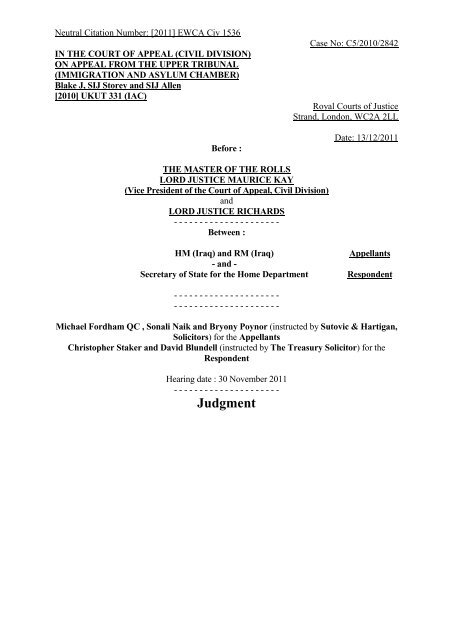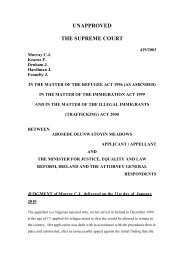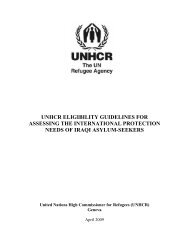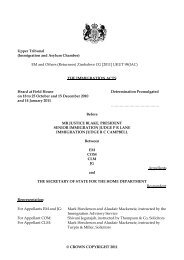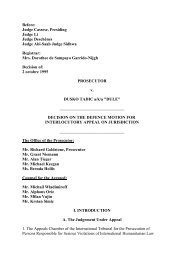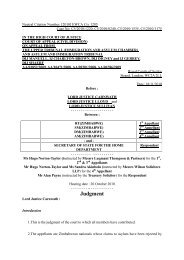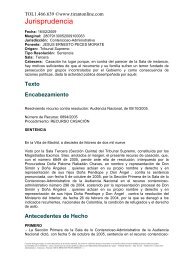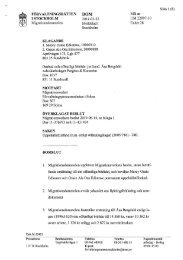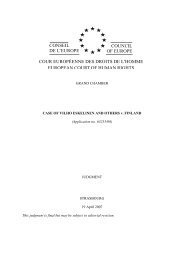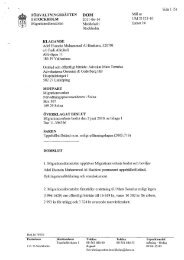UK_066 Judgment.pdf - European Database of Asylum Law
UK_066 Judgment.pdf - European Database of Asylum Law
UK_066 Judgment.pdf - European Database of Asylum Law
You also want an ePaper? Increase the reach of your titles
YUMPU automatically turns print PDFs into web optimized ePapers that Google loves.
Neutral Citation Number: [2011] EWCA Civ 1536<br />
IN THE COURT OF APPEAL (CIVIL DIVISION)<br />
ON APPEAL FROM THE UPPER TRIBUNAL<br />
(IMMIGRATION AND ASYLUM CHAMBER)<br />
Blake J, SIJ Storey and SIJ Allen<br />
[2010] <strong>UK</strong>UT 331 (IAC)<br />
Before :<br />
Case No: C5/2010/2842<br />
Royal Courts <strong>of</strong> Justice<br />
Strand, London, WC2A 2LL<br />
Date: 13/12/2011<br />
THE MASTER OF THE ROLLS<br />
LORD JUSTICE MAURICE KAY<br />
(Vice President <strong>of</strong> the Court <strong>of</strong> Appeal, Civil Division)<br />
and<br />
LORD JUSTICE RICHARDS<br />
- - - - - - - - - - - - - - - - - - - - -<br />
Between :<br />
HM (Iraq) and RM (Iraq)<br />
- and -<br />
Secretary <strong>of</strong> State for the Home Department<br />
Appellants<br />
Respondent<br />
- - - - - - - - - - - - - - - - - - - - -<br />
- - - - - - - - - - - - - - - - - - - - -<br />
Michael Fordham QC , Sonali Naik and Bryony Poynor (instructed by Sutovic & Hartigan,<br />
Solicitors) for the Appellants<br />
Christopher Staker and David Blundell (instructed by The Treasury Solicitor) for the<br />
Respondent<br />
Hearing date : 30 November 2011<br />
- - - - - - - - - - - - - - - - - - - - -<br />
<strong>Judgment</strong>
<strong>Judgment</strong> Approved by the court for handing down.<br />
HM (Iraq) and RM (Iraq) v SSHD<br />
Lord Justice Richards :<br />
1. This appeal concerns a country guidance determination <strong>of</strong> the Upper Tribunal<br />
(Immigration and <strong>Asylum</strong> Chamber) on the application <strong>of</strong> Article 15(c) <strong>of</strong> Council<br />
Directive 2004/83/EC (“the Qualification Directive”) to conditions in Iraq: see HM &<br />
Others (Article 15(c)) Iraq CG [2010] <strong>UK</strong>UT 331 (IAC), promulgated on 21<br />
September 2010. The tribunal had grouped together four appeals for the purpose and,<br />
in the course <strong>of</strong> extensive case management, had given permission to the United<br />
Nations High Commissioner for Refugees (“UNHCR”) to participate in the<br />
proceedings as a party. The case was listed for a five-day hearing between 7 and 11<br />
June 2010 before Blake J (the President <strong>of</strong> the Chamber) and Senior Immigration<br />
Judges Storey and Allen. Thus, it was set up for an authoritative decision on an<br />
important issue. Most unfortunately, as described below, all four appellants had their<br />
legal representation withdrawn at a very late stage. This left the tribunal in an<br />
extremely difficult position. It took the decision to proceed with the hearing and to<br />
promulgate a country guidance determination notwithstanding that the appellants<br />
were unrepresented and were unable to make any further contribution to the<br />
proceedings.<br />
2. HM and RM, two <strong>of</strong> those whose appeals were before the tribunal, subsequently<br />
obtained public funding for the purpose <strong>of</strong> appealing to this court against the<br />
tribunal’s determination. They were represented before us by solicitors and counsel.<br />
The appeal was brought on procedural and substantive grounds. The procedural<br />
grounds included the contention that the tribunal was wrong to proceed to a country<br />
guidance determination in circumstances where the appellants were unrepresented and<br />
there was no-one else to act as “proper contradictor” to the Secretary <strong>of</strong> State’s<br />
submissions. At the hearing on 30 November 2011, having heard oral argument on<br />
the procedural grounds, we announced our decision to allow the appeal, quash the<br />
determination and remit the case to the tribunal, for reasons to be given in writing at a<br />
later date. These are my reasons for the decision.<br />
The proceedings before the tribunal<br />
3. The background is set out with great care and clarity in the tribunal’s determination,<br />
from which I take the following.<br />
4. There were four appellants before the tribunal: they were referred to as HM, RM,<br />
ASA and AA. It is not necessary to describe the earlier stages <strong>of</strong> their appeals. By<br />
late 2009 the appeals had been grouped together to form country guidance on Article<br />
15(c) <strong>of</strong> the Qualification Directive, which concerns the risk <strong>of</strong> serious harm<br />
consisting <strong>of</strong> a “serious and individual threat to a civilian’s life or person by reason <strong>of</strong><br />
indiscriminate violence in situations <strong>of</strong> international or internal armed conflict”. The<br />
four appellants were young men who apparently came from the cities <strong>of</strong> Kirkuk,<br />
Baquabah and Baghdad respectively. Their cases involved consideration <strong>of</strong> the levels<br />
<strong>of</strong> violence in different parts <strong>of</strong> Iraq and the implications <strong>of</strong> those levels for young<br />
men with no distinguishing characteristics other than place <strong>of</strong> residence in Iraq.<br />
5. At a CMR hearing on 1 December 2009, HM, RM and ASA were represented by<br />
counsel instructed by Refugee and Migrant Justice (“RMJ”); and AA was represented<br />
by counsel instructed by Wilson and Co. At that stage the tribunal was aiming to list<br />
the case in March 2010.
<strong>Judgment</strong> Approved by the court for handing down.<br />
HM (Iraq) and RM (Iraq) v SSHD<br />
6. On 3 February 2010 notices were issued that the appeals would be heard as country<br />
guidance cases between 7 and 11 June. At a further CMR hearing on 10 May the<br />
tribunal, having decided not to join a further appeal to the existing four, issued a<br />
number <strong>of</strong> directions. They included a direction that –<br />
“[The] appeals to be country guidance cases on the application<br />
<strong>of</strong> Art 15(c) <strong>of</strong> the Qualification Directive to the appellants and<br />
address:<br />
a. Whether there is a risk to the appellants <strong>of</strong> indiscriminate<br />
violence arising from armed conflict within the meaning <strong>of</strong><br />
Article 15(c) in their home areas in Iraq.<br />
b. If so whether internal relocation within Iraq is available to<br />
any <strong>of</strong> the appellants.<br />
c. If so whether the intended route <strong>of</strong> return enables them to<br />
access such a place in safety.”<br />
7. A further direction was that the UNHCR be joined as a party. The UNHCR<br />
subsequently filed written submissions dated 27 May. Those submissions record that<br />
this was the UNHCR’s first intervention in proceedings in the tribunal, though it had<br />
previously intervened in cases in the English higher courts and regularly intervened in<br />
courts and tribunals in other jurisdictions. Its approach to interventions was described<br />
as follows:<br />
“When intervening in legal proceedings it is UNHCR’s practice<br />
to address its submissions to issues <strong>of</strong> international refugee law<br />
and doctrine and, to a more limited extent, to address general<br />
country conditions. It does not generally advance submissions<br />
on the facts <strong>of</strong> particular cases. UNHCR understands the<br />
importance <strong>of</strong> not duplicating submissions advanced by the<br />
parties and only participates when and to the extent that it<br />
considers that its participation could be <strong>of</strong> value to the<br />
Tribunal.”<br />
8. There were then three pages <strong>of</strong> written submissions on Article 15(c), together with a<br />
number <strong>of</strong> enclosures. The submissions referred to, and enclosed a copy <strong>of</strong>,<br />
UNHCR’s submissions to the Court <strong>of</strong> Appeal in QD (Iraq) v Secretary <strong>of</strong> State for<br />
the Home Department [2009] EWCA Civ 620, [2011] 1 WLR 689, a case in which<br />
the Court <strong>of</strong> Appeal had formally annexed UNHCR’s submissions to its judgment.<br />
UNHCR stated that it did not consider it necessary to add to those submissions save to<br />
draw attention to four matters, namely two decisions in other jurisdictions; UNHCR’s<br />
own Eligibility Guidelines for Assessing the International Protection Needs <strong>of</strong> Iraqi<br />
<strong>Asylum</strong> Seekers, dated April 2009; and UNHCR’s position that generally no internal<br />
flight alternative would be available in Iraq. It should, however, be noted that<br />
UNHCR’s submissions in QD (Iraq) included only one paragraph on actual country<br />
conditions in Iraq, stating that UNHCR’s analysis <strong>of</strong> the current situation in Iraq was<br />
set out in detail in its Eligibility Guidelines, and summarising the position as follows:
<strong>Judgment</strong> Approved by the court for handing down.<br />
HM (Iraq) and RM (Iraq) v SSHD<br />
“In view <strong>of</strong> the serious human rights violations and ongoing<br />
security incidents which are continuing predominantly in the<br />
five Central Governorates <strong>of</strong> Baghdad, Diyala, Kirkuk, Ninewa<br />
and Salah Din (capital: Samarra), the UNHCR continues to<br />
assess that all Iraq asylum-seekers from these five<br />
Governorates are in need <strong>of</strong> international protection. UNHCR<br />
considers that asylum-seekers from these Governorates qualify<br />
for protection under Article 15(c) <strong>of</strong> the Qualification Directive<br />
if they do not qualify as refugees or qualify for protection under<br />
Article 15(a) or (b).”<br />
9. The terms on which UNHCR was permitted to participate in the proceedings did not<br />
limit it to written submissions. Indeed, one <strong>of</strong> the directions given was that UNHCR<br />
should inform the parties and the tribunal by 27 May whether its submissions “at the<br />
hearing” would differ from those it had made in QD (Iraq) “subject to any response<br />
made to the skeleton arguments <strong>of</strong> the other parties”. It was therefore envisaged that<br />
UNHCR might participate in the hearing. In the event, however, having made clear in<br />
its written submissions that its position did not differ from that in QD (Iraq), it was<br />
not represented by counsel at the hearing. We are told that a representative <strong>of</strong> some<br />
kind did attend the hearing but only, it would seem, in the capacity <strong>of</strong> an observer.<br />
10. By letter to the tribunal dated 26 May, RMJ indicated that they proposed to serve the<br />
joint bundle <strong>of</strong> country material, an expert opinion (<strong>of</strong> Dr Herring) and any further<br />
evidence by 28 May, and that it was hoped to file a skeleton argument by 1 June.<br />
Those dates were later than provided for in the tribunal’s directions. RMJ also stated<br />
in the letter that they were without instructions in the case <strong>of</strong> ASA, and they applied<br />
to be taken <strong>of</strong>f the record. It subsequently emerged that RMJ had lost contact with<br />
ASA and considered they could not continue to act for him. The tribunal observed at<br />
para [30] <strong>of</strong> its determination that it did not know when contact was last made with<br />
ASA and what his instructions were then, but the country guidance appeal did not<br />
depend on his personal instructions. If he was willing to continue with his appeal on<br />
Article 15(c) grounds in the autumn <strong>of</strong> 2009, it could not see why he would be<br />
unwilling for it to be determined subsequently. It expressed disappointment that no<br />
earlier warning had been given <strong>of</strong> a potential problem in selecting ASA’s case for<br />
guidance.<br />
11. On 28 May the tribunal indicated that in the light <strong>of</strong> the representations made the<br />
appeal would not begin until 8 June, rather than 7 June as originally envisaged.<br />
12. On 1 June Wilson & Co wrote to the tribunal informing it that in the light <strong>of</strong> the<br />
expert evidence commissioned for the case they could no longer represent AA in the<br />
appeal. They sought the tribunal’s consent to the withdrawal <strong>of</strong> the appeal and<br />
indicated that they could no longer justify the appeal being publicly funded pursuant<br />
to their contract with the Legal Services Commission (“the LSC”) as they could no<br />
longer estimate that the prospects <strong>of</strong> success in the appeal were 50% or higher. They<br />
explained that AA had intended to rely on the report commissioned by RMJ and that<br />
“the expert evidence in finalised form was not consistent with the direction that the<br />
drafts and verbal communications … were taking”.<br />
13. On the same day RMJ sent a fax to the tribunal stating that they were no longer<br />
instructed in the appeals <strong>of</strong> HM and RM and asking to be taken <strong>of</strong>f the record in those
<strong>Judgment</strong> Approved by the court for handing down.<br />
HM (Iraq) and RM (Iraq) v SSHD<br />
appeals. They said that they had advised their clients <strong>of</strong> the need to secure alternative<br />
representation for the hearing.<br />
14. The tribunal indicated that it was not prepared to accede to the request from Wilson &<br />
Co to withdraw AA’s appeal, sought further information as to the position <strong>of</strong> RMJ<br />
and the clients they formerly represented, and issued further directions with a view to<br />
keeping open the possibility <strong>of</strong> hearing the appeals on 8 June.<br />
15. On 8 June, when the case was called on, none <strong>of</strong> the appellants appeared in person.<br />
Counsel instructed by Wilson & Co and RMJ respectively did appear, but only to<br />
explain the position and not to make submissions in support <strong>of</strong> the appeals. It was<br />
explained by counsel instructed by RMJ that Dr Herring’s report had been made<br />
available late on 28 May and had been considered by counsel the following day and<br />
that a conference had been held on 1 June, at which instructions were withdrawn.<br />
Legal pr<strong>of</strong>essional privilege prevented further information being given as to the<br />
reasons why instructions were withdrawn, and litigation privilege prevented<br />
disclosure <strong>of</strong> Dr Herring’s report itself.<br />
16. Later in the morning, HM and RM themselves attended the hearing and indicated<br />
through a court interpreter that they wanted the appeal to continue and they wanted<br />
RMJ to represent them in the appeal.<br />
17. The tribunal’s reaction to those events, and how matters then proceeded, are described<br />
as follows in the determination:<br />
“36. The present appeals had long been designated as intended<br />
to give guidance in circumstances where many hundreds <strong>of</strong><br />
cases before the Tribunal and the higher courts have been<br />
stayed awaiting a judicial assessment <strong>of</strong> risk in Iraq applying<br />
Article 15(c) and related criteria. ‘Country guidance’ is a well<br />
established technique in the AIT and transferred to the Upper<br />
Tribunal pursuant to Senior President <strong>of</strong> Tribunal (SPT)<br />
Practice Directions. A duplication <strong>of</strong> time effort and public<br />
funds by appellants, respondents and judges considering<br />
appeals at all levels can be avoided by thorough and<br />
painstaking review <strong>of</strong> the background materials, with<br />
commentaries and assessment by objective and informed<br />
experts where necessary and the material tested through the<br />
participation <strong>of</strong> experienced legal teams on both sides to assist<br />
the Tribunal to identify the relevant issues and direct itself<br />
appropriately in law.<br />
…<br />
38. Although any appeal in the field <strong>of</strong> protection has<br />
importance for the individual appellant, country guidance cases<br />
have an importance far beyond that. This country guidance<br />
case in particular was not founded on any individual<br />
characteristic <strong>of</strong> any <strong>of</strong> the appellants other than their place <strong>of</strong><br />
normal residence, nationality, age and gender. Considerable<br />
public funds had already been expended in processing the cases
<strong>Judgment</strong> Approved by the court for handing down.<br />
HM (Iraq) and RM (Iraq) v SSHD<br />
from their original rejection in 2007 and 2008 to 2010. Since<br />
the cases had been identified as country guidance cases in<br />
October 2009, the Home Office had prepared three volumes <strong>of</strong><br />
country material and the UNHCR had prepared written<br />
submissions and two volumes <strong>of</strong> material. Five days had been<br />
set aside for a three person panel <strong>of</strong> the Upper Tribunal with the<br />
President in the chair to hear the case.<br />
39. The circumstances in which a late change <strong>of</strong> mind was<br />
communicated were for the reasons set out above wholly<br />
unsatisfactory and in RMJ’s case at least did not condescend to<br />
an explanation <strong>of</strong> whether the appellants sought to withdraw<br />
the appeal altogether or why instructions were said to have<br />
been withdrawn ….<br />
40. We indicated that we were unwilling to accede to the<br />
applications to withdraw the appeals at this late stage, and<br />
concluded that there was an overriding public interest in<br />
proceeding to determine them. We adjourned the matter for a<br />
few hours for the parties to consider their positions further, and<br />
for RMJ to consider whether it could after all represent their<br />
clients in the light <strong>of</strong> … RM and HM’s request.<br />
41. On the afternoon <strong>of</strong> 8 June, the position regarding AA<br />
remained the same. [Counsel] informed us that he still wished<br />
to withdraw his appeal; in the event that the appeal was not<br />
withdrawn the appellant would not be represented, and did not<br />
wish to participate and had no evidence or submissions he<br />
wished to advance to us. We had already been informed that<br />
this was based on the legal representatives’ assessment <strong>of</strong><br />
prospects <strong>of</strong> success in the light <strong>of</strong> the expert’s report.<br />
42. As regards HM and RM, we were informed that the<br />
appellants did not want the expert report to be adduced in their<br />
appeals. No instructions had been give to amplify the matter.<br />
The brothers now wished also to withdraw their appeal and had<br />
been informed <strong>of</strong> the consequences <strong>of</strong> so doing. It appeared<br />
that even though the public interest in the appeals continuing<br />
and RMJ continuing to act had been brought to the attention <strong>of</strong><br />
the Legal Services Commission (LSC), further funding for<br />
representation was refused applying its established criteria.<br />
43. It was apparent that the appeal <strong>of</strong> ASA had to be<br />
determined as no instructions had been received to withdraw.<br />
This would require an examination <strong>of</strong> the background evidence<br />
in respect <strong>of</strong> Baghdad (the intended place <strong>of</strong> return) and<br />
Baquabah in Diyala (the intended place <strong>of</strong> residence) as set<br />
against the legal criteria identified by the Court <strong>of</strong> Appeal in<br />
QD. Examination <strong>of</strong> the material specifically relating to<br />
Kirkuk (the intended place <strong>of</strong> residence fro RM and HM) added
<strong>Judgment</strong> Approved by the court for handing down.<br />
HM (Iraq) and RM (Iraq) v SSHD<br />
little by way <strong>of</strong> further time in hearing submissions and making<br />
a determination.<br />
44. We remained <strong>of</strong> the view that the public interest reasons<br />
why these appeals should be determined and the material so<br />
carefully brought together judicially assessed were<br />
overwhelming. We refused the application to withdraw the<br />
appeals and we now give full reasons for doing so.”<br />
18. We were told by Mr Staker, who appeared below, that that was a full account <strong>of</strong> the<br />
steps taken by the tribunal, save that the tribunal not only asked the appellants’ former<br />
legal representatives to contact the LSC with a view to reconsidering the decision as<br />
to public funding, but also asked them whether they would act in the appeals pro bono<br />
if public funding was not available. The representatives for HM and RM, having<br />
contacted the LSC, confirmed that legal aid was not available and also indicated that<br />
they were unable to act pro bono.<br />
The reasons for the decision to proceed<br />
19. The tribunal gave detailed reasons for the decision to proceed with the hearing <strong>of</strong> the<br />
four appeals:<br />
“45. We had regard to the overriding objective to deal with<br />
appeals justly and fairly under Rule 2 <strong>of</strong> the Tribunal Procedure<br />
(Upper Tribunal) Rules. We concluded that in a country<br />
guidance case <strong>of</strong> this type, justice and fairness was also owed to<br />
the many hundreds <strong>of</strong> appellants whose cases would be<br />
materially affected by a thorough review <strong>of</strong> all the available up<br />
to date material and the application <strong>of</strong> the test in QD.<br />
46. As regards the specific factors in Rule 2(2) we concluded:<br />
a. ‘dealing with the case in ways which are proportionate to<br />
the importance <strong>of</strong> the case, the complexity <strong>of</strong> the issues, the<br />
anticipated costs and resources <strong>of</strong> the parties’<br />
The importance was considerable, and the costs already<br />
largely incurred in the previous six months. The costs would<br />
be entirely wasted if we did not determine the appeals and<br />
would fall to be regenerated in future appeals where the<br />
parties may not have had the experience or the resources <strong>of</strong><br />
the RMJ in identifying an appropriate expert.<br />
b. ‘avoiding unnecessary formality and seeking flexibility in<br />
the proceedings’<br />
We had through paper directions, active case management<br />
and short adjournments sought to explore every practical<br />
way to advance the overriding objective. We considered<br />
whether we should call the expert Dr Herring ourselves,<br />
despite the fact that assertion <strong>of</strong> litigation privilege had
<strong>Judgment</strong> Approved by the court for handing down.<br />
HM (Iraq) and RM (Iraq) v SSHD<br />
prevented us knowing <strong>of</strong> his conclusions. Although this<br />
course was clearly open to us and may be an appropriate<br />
course <strong>of</strong> future action, we decided against it in this case ….<br />
c. ‘ensuring so far as practicable that the parties are able to<br />
participate fully in the proceedings’<br />
We had done what we could to ensure that the appellants<br />
were represented and assisted …. Although we were<br />
concerned that RM and HM who initially expressed to us a<br />
wish to continue with their appeals would be severely<br />
restricted as unrepresented litigants with little or no English,<br />
we noted that on further instructions they had expressly<br />
indicated that they did [not] want to place any further<br />
material before the Upper Tribunal and had sought to<br />
withdraw the appeal thus indicating that there was nothing<br />
further they wished to draw to our attention. We add here<br />
that the brothers stayed to listen to the subsequent appeal,<br />
the gist <strong>of</strong> which was translated to them by the interpreter<br />
and confirmed on more than one occasion that they did not<br />
wish to add anything or make any submission.<br />
d. ‘using any special expertise <strong>of</strong> the Upper Tribunal<br />
effectively’<br />
We consider that the Upper Tribunal has special<br />
responsibility and expertise to assist Immigration Judges,<br />
primary decision-makers and litigants by engaging in up to<br />
date assessments <strong>of</strong> risks in countries giving rise to<br />
commonly occurring situations, where it is possible and<br />
reasonably practical to do so.<br />
e. ‘avoiding delay so far as compatible with proper<br />
consideration <strong>of</strong> the issues’<br />
The narrative <strong>of</strong> events in these cases speaks for itself. It<br />
would probably have taken another six months to set up<br />
another constitution to deal with further appeals raising these<br />
issues. Avoiding delay is always an important consideration<br />
in immigration cases to both sides for differing reasons. In<br />
our judgment it is particularly important in Article 15(c)<br />
cases where levels <strong>of</strong> general violence arising in armed<br />
conflict may change rapidly in the course <strong>of</strong> weeks or<br />
months and there is always the considerable likelihood <strong>of</strong><br />
assessments being out <strong>of</strong> date.”<br />
20. The tribunal went on in para [47] to state that it had the benefit <strong>of</strong> a detailed skeleton<br />
argument from the Secretary <strong>of</strong> State and that the hearing took the form <strong>of</strong> an<br />
elaboration <strong>of</strong> aspects <strong>of</strong> the written arguments by reference to the factual materials, a<br />
formal response to the written submissions <strong>of</strong> UNHCR, and response to questions put<br />
by members <strong>of</strong> the tribunal as to various matters <strong>of</strong> law, fact and the practicalities <strong>of</strong>
<strong>Judgment</strong> Approved by the court for handing down.<br />
HM (Iraq) and RM (Iraq) v SSHD<br />
the intended return to Iraq. At the end <strong>of</strong> the hearing some information remained<br />
outstanding or subject to confirmation in writing. The tribunal asked that it be<br />
provided within 14 days and directed that a copy should be sent to HM and RM.<br />
While the decision was under consideration further information relating to the return<br />
<strong>of</strong> failed asylum seekers to Iraq came to the tribunal’s attention and the tribunal asked<br />
for further information from UNHCR and from the Secretary <strong>of</strong> State, the appellants<br />
again being copied in.<br />
21. At paras [48]-[53] the tribunal made further comments on the problems that had<br />
arisen in these cases and indicated the lines along which the case management <strong>of</strong><br />
country guidance cases should proceed in the future. It hoped that with those<br />
measures in place last-minute changes <strong>of</strong> position could be avoided, and that if the<br />
tribunal were left in the unfortunate position that one party was no longer willing or<br />
able to participate in the appeal it would have before it that party’s submissions and<br />
the documentary form <strong>of</strong> any material the party had intended to rely on. It also hoped<br />
that the LSC would be able to consider means by which public funding could be<br />
continued in such a case.<br />
The tribunal’s consideration <strong>of</strong> the substantive issues<br />
22. I refer to the tribunal’s consideration <strong>of</strong> the substantive issues solely to throw further<br />
light on the nature and importance <strong>of</strong> the determination. In Part 2, at paras [54]-[98],<br />
the tribunal considered the meaning <strong>of</strong> Article 15(c), concluding at para [98] with a<br />
list <strong>of</strong> questions it had posed for itself by way <strong>of</strong> summary <strong>of</strong> its legal conclusions.<br />
Part 3, at paras [99]-[210], examined the background evidence, including evidence<br />
relating to the return <strong>of</strong> Iraqi failed asylum seekers on charter flights to Baghdad on 9<br />
and 16 June (having come to light after the date <strong>of</strong> the hearing). Part 4, at paras<br />
[211]-[231], summarised the submissions on the facts: there were <strong>of</strong> course no<br />
submissions on behalf <strong>of</strong> the appellants, but the tribunal summarised UNHCR’s April<br />
2009 Eligibility Guidelines and later updates, together with the submissions <strong>of</strong> the<br />
Secretary <strong>of</strong> State. Part 5, at para [232], referred to existing country guidance cases,<br />
in particular KH (Article 15(c) Qualification Directive) Iraq CG [2008] <strong>UK</strong>AIT<br />
00023, the approach in which had been disapproved by the Court <strong>of</strong> Appeal in QD<br />
(Iraq).<br />
23. In Part 6, at paras [233]-[278], the tribunal set out its general assessment, including its<br />
reasons for differing from UNHCR’s position. Its principal conclusions were<br />
summarised in para [278] and included the following:<br />
“(ii) We do not find that the degree <strong>of</strong> indiscriminate violence<br />
characterising the current armed conflict taking place in Iraq<br />
reaches such a high level that substantial grounds are shown for<br />
believing that any civilian returned there would, solely on<br />
account <strong>of</strong> his presence there face a real risk <strong>of</strong> being subject to<br />
that threat ….<br />
(iii) But even if there were certain areas where the violence<br />
reached levels sufficient in our judgment to engage Article<br />
15(c) we consider that there is likely to be considerable scope<br />
for internal relocation that achieves both safety and<br />
reasonableness in all the circumstances ….
<strong>Judgment</strong> Approved by the court for handing down.<br />
HM (Iraq) and RM (Iraq) v SSHD<br />
(vi) The evidence relating to <strong>UK</strong> returnees to Iraq in June 2010<br />
does not demonstrate that the returns process will involve<br />
serious harm ….”<br />
24. Part 7, at paras [279]-[292], contained an assessment in respect <strong>of</strong> each <strong>of</strong> the<br />
appellants, concluding that none <strong>of</strong> them faced a real risk <strong>of</strong> serious harm in their<br />
home areas and that they could in any event travel internally within Iraq. That led<br />
into Part 8, at paras [293]-[305], where the tribunal gave further consideration to the<br />
issue <strong>of</strong> internal relocation and concluded that such an alternative was available to all<br />
the appellants. Accordingly, the tribunal dismissed each <strong>of</strong> the appeals.<br />
The appellants’ case before this court<br />
25. The appellants were represented before us by a different team from that which acted<br />
in the run-up to the hearing before the tribunal. Mr Fordham QC’s submissions on<br />
their behalf opened with the importance <strong>of</strong> the issue <strong>of</strong> safety <strong>of</strong> return to Iraq and the<br />
significance and controversial nature <strong>of</strong> the tribunal’s conclusions on that issue.<br />
26. His written skeleton argument advanced submissions under five heads, to the effect<br />
that (1) it was wrong in principle for the tribunal to proceed to deliver a country<br />
guidance determination, absent a representative acting for the appellants or otherwise<br />
appearing before the tribunal as a “proper contradictor” to the submissions on behalf<br />
<strong>of</strong> the Secretary <strong>of</strong> State; (2) the tribunal adopted an approach which was wrong in<br />
principle in undertaking an “inquisitorial” function <strong>of</strong> eliciting and evaluating<br />
material; (3) the tribunal’s conclusions on Article 15(c) were unsound in law; (4) the<br />
tribunal’s approach to internal relocation was an unsatisfactory half-way house; and<br />
(5) the tribunal’s approach to the issue <strong>of</strong> ill-treatment as returnees gave rise to serious<br />
concerns <strong>of</strong> procedure and substance.<br />
27. We invited argument first on the main procedural issues, i.e. issues (1) and (2).<br />
Having heard submissions from both sides on those issues, we decided that the appeal<br />
should be allowed. That made it unnecessary for us to consider the remaining issues,<br />
and I need say nothing further about them save to emphasise that they are left open for<br />
argument as necessary on a future occasion.<br />
28. Mr Fordham’s submissions in relation to issue (1), under the heading “no proper<br />
contradictor”, emphasised the special “declaratory” nature (as it was said to be) and<br />
authoritative status <strong>of</strong> a country guidance determination. Researches indicated that<br />
over 100 country guidance determinations had been handed down since the formation<br />
<strong>of</strong> the <strong>Asylum</strong> and Immigration Tribunal in April 2005, and all <strong>of</strong> those involved the<br />
individual appellants being represented before the tribunal. There was submitted to<br />
be a well recognised need for a “proper contradictor” in cases where rulings <strong>of</strong> a<br />
declaratory nature were sought. No public law court would grant an advisory<br />
declaration at the invitation <strong>of</strong> the Secretary <strong>of</strong> State without securing contested<br />
argument, still less on a matter as anxious as safety on return in an asylum and human<br />
rights context. UNHCR’s intervention in the proceedings before the tribunal was not<br />
sufficient for the purpose: UNHCR had simply put in written submissions, it did not<br />
have the function <strong>of</strong> arguing points on behalf <strong>of</strong> the appellants and it did not deal with<br />
the issues in the way representatives <strong>of</strong> the appellants would have done.
<strong>Judgment</strong> Approved by the court for handing down.<br />
HM (Iraq) and RM (Iraq) v SSHD<br />
29. Mr Fordham submitted that as a matter <strong>of</strong> legal principle there had to be a proper<br />
contradictor in any country guidance determination and that the tribunal was therefore<br />
wrong in law to proceed without one; alternatively, that the tribunal erred in the<br />
exercise <strong>of</strong> its discretion in proceeding without one in this case, or at least in failing to<br />
explore whether it was possible to secure one by inviting UNHCR to play that role at<br />
an oral hearing or by seeking the appointment <strong>of</strong> an amicus curiae or other Stateappointed<br />
representative to perform the function. If it was not possible to secure a<br />
proper contradictor, then the tribunal should not have proceeded to hear the matter at<br />
all and should have consented to the appellants’ applications to withdraw their appeals<br />
(which would have left open for the appellants the possibility <strong>of</strong> a fresh claim based<br />
on changes in circumstances since the original decision).<br />
30. The case advanced in relation to issue (2) overlapped in part with the case on issue<br />
(1). It was submitted that the tribunal operates within an essentially adversarial<br />
system and that its function is to reach determinations based on competing arguments<br />
from opposing parties, not to adopt an inquisitorial role; yet the effect <strong>of</strong> proceeding<br />
in this case without a proper contradictor was to lead the tribunal into an inappropriate<br />
inquisitorial role. Alternatively, if, contrary to the appellants’ primary case, it was not<br />
essential for there to be a proper contradictor, then the only way <strong>of</strong> doing justice was<br />
for the tribunal to depart from the normal rule and to take on a fully inquisitorial role,<br />
with a special investigative responsibility; but the position actually reached was an<br />
unsatisfactory half-way house in which the tribunal found some materials for itself but<br />
missed others.<br />
“No proper contradictor”<br />
31. A country guidance determination has a special status. Practice Directions dated 10<br />
February 2010, issued by the Senior President <strong>of</strong> Tribunals in relation to proceedings<br />
in the Immigration and <strong>Asylum</strong> Chambers <strong>of</strong> the First-Tier Tribunal and the Upper<br />
Tribunal, provide:<br />
“12.2 A reported determination <strong>of</strong> the Tribunal, the AIT or the<br />
IAT bearing the letters ‘CG’ shall be treated as an authoritative<br />
finding on the country guidance issue identified in the<br />
determination, based upon the evidence before the members <strong>of</strong><br />
the Tribunal, the AIT or the IAT that determine the appeal. As<br />
a result, unless it has been expressly superseded or replaced by<br />
any later ‘CG’ determination, or is inconsistent with other<br />
authority that is binding on the Tribunal, such a country<br />
guidance case is authoritative in any subsequent appeal, so far<br />
as that appeal (a) relates to the country guidance issue in<br />
question; and (b) depends upon the same or similar evidence.<br />
…<br />
12.4 Because <strong>of</strong> the principle that like cases should be treated<br />
in like manner, any failure to follow a clear, apparently<br />
applicable country guidance case or to show why it does not<br />
apply to the case in question is likely to be regarded as grounds<br />
for appeal on a point <strong>of</strong> law.”
<strong>Judgment</strong> Approved by the court for handing down.<br />
HM (Iraq) and RM (Iraq) v SSHD<br />
32. Those provisions reflect earlier practice directions in respect <strong>of</strong> determinations by the<br />
AIT. Their effect was considered, for example, in OM (AA(1) wrong in law)<br />
Zimbabwe CG [2006] <strong>UK</strong>AIT 00077 at [11]-[12], where the tribunal said this:<br />
“Country guidance stands, in accordance with the Practice<br />
Directions, unless and until it becomes unreliable. Broadly,<br />
this can happen for one <strong>of</strong> two reasons. Firstly, fresh evidence<br />
can emerge that casts new light on circumstances in the country<br />
considered. This can be the result, for example, <strong>of</strong> a change <strong>of</strong><br />
regime or <strong>of</strong> a new report from a respected non governmental<br />
organisation. In such an event the Practice Directions permit a<br />
different conclusion from that required by the existing country<br />
guidance. Secondly, country guidance can be overturned<br />
because the case was decided wrongly in law ….”<br />
33. At para [38] <strong>of</strong> the determination under appeal, the Upper Tribunal itself laid stress on<br />
the fact that country guidance cases have an importance far beyond that for the<br />
individual appellants; and at para [45] it referred to the many hundreds <strong>of</strong> appellants<br />
whose cases would be materially affected by its determination. The particular<br />
importance <strong>of</strong> the determination is obvious. The issue <strong>of</strong> safety on return to Iraq is<br />
troubling and controversial. UNHCR has adhered to the recommendation in its April<br />
2009 Eligibility Guidelines that States should refrain from forcibly returning Iraqis<br />
who, inter alia, originate from the five central governorates. We were told that the<br />
United Kingdom is among a minority <strong>of</strong> States seeking to enforce removals from the<br />
EU. The application <strong>of</strong> Article 15(c) to conditions in Iraq is a matter <strong>of</strong> considerable<br />
sensitivity.<br />
34. That is the context within which Mr Fordham’s submissions on proper contradictor<br />
fall to be considered.<br />
35. The expression “proper contradictor” is drawn from the speech <strong>of</strong> Lord Dunedin in<br />
Russian Commercial and Industrial Bank v British Bank for Foreign Trade Ltd<br />
[1921] 2 AC 438 at page 448, where he said this with reference to the ancient Scottish<br />
action <strong>of</strong> declarator:<br />
“The rules that have been elucidated by a long course <strong>of</strong><br />
decisions in the Scottish courts may be summarized thus: The<br />
question must be a real and not a theoretical question; the<br />
person raising it must have a real interest to raise it; he must be<br />
able to secure a proper contradictor, that is to say, someone<br />
presently existing who has a true interest to oppose the<br />
declaration sought.”<br />
36. Mr Staker, on behalf <strong>of</strong> the Secretary <strong>of</strong> State, contended that the principle to which<br />
the requirement <strong>of</strong> a proper contradictor gives effect is that a court will not grant a<br />
declaration in relation to a theoretical or academic question in respect <strong>of</strong> which there<br />
is no-one having a proper interest to oppose it, and that even in that context the<br />
requirement is not an absolute one. That submission derives strong support from<br />
observations <strong>of</strong> Lord Rodger <strong>of</strong> Earlsferry in Clarke v Fennoscandia Ltd [2007]<br />
<strong>UK</strong>HL 56, [2008] SC (HL) 122, at [29]:
<strong>Judgment</strong> Approved by the court for handing down.<br />
HM (Iraq) and RM (Iraq) v SSHD<br />
“The absence <strong>of</strong> a contradictor in an action for declarator will<br />
usually matter because it will be an indication that there is no<br />
live controversial legal issue which the court could properly<br />
spend its time considering and determining. But the <strong>Law</strong><br />
Hospital case [<strong>Law</strong> Hospital NHS Trust v Lord Advocate<br />
[1996] SC 301] actually raised a legal issue <strong>of</strong> acute practical<br />
importance to members <strong>of</strong> the medical pr<strong>of</strong>ession all over<br />
Scotland. Unusually, therefore, despite the fact that the<br />
defenders were not opposing the substance <strong>of</strong> the declarators<br />
and so there was no proper contradictor, there was still an<br />
important public interest to be served by the Court <strong>of</strong> Session<br />
considering the whole position and, in the end, deciding<br />
whether to grant the declarator sought …. In these special<br />
circumstances it was competent for decree <strong>of</strong> declarator to be<br />
pronounced. Here, by contrast, the case concerns a dispute<br />
which was only ever <strong>of</strong> concern to the parties. Now that the<br />
undertaking has been given, no public interest would be served<br />
by the Court <strong>of</strong> Session hearing evidence and determining what<br />
is now an academic point ….”<br />
37. It is unnecessary to reach any conclusion on the precise requirements <strong>of</strong> the Scottish<br />
action <strong>of</strong> declarator, with which we are not directly concerned, but the broad<br />
principles underlying it have been drawn on when considering the discretionary<br />
power to grant declaratory relief in the English courts. In re F (Mental Patient:<br />
Sterilisation) [1990] 2 AC 1 concerned the grant <strong>of</strong> a declaration that a proposed<br />
operation was in the best interests <strong>of</strong> a patient unable to consent because <strong>of</strong> her mental<br />
incapacity. Lord G<strong>of</strong>f <strong>of</strong> Chieveley, having referred to the existence <strong>of</strong> a discretion to<br />
grant a declaration under the ordinary rules <strong>of</strong> civil procedure, observed at page 82D<br />
that there are <strong>of</strong> course some limits which have been established to the exercise <strong>of</strong> the<br />
discretion. He cited the passage quoted above from Lord Dunedin’s speech in<br />
Russian Commercial and Industrial Bank v British Bank for Foreign Trade Ltd, and<br />
continued:<br />
“Subsequently, in Vine v National Dock Labour Board [1957]<br />
AC 488, 500, Viscount Kilmuir LC found this Scottish<br />
approach to be helpful; and indeed there is authority in the<br />
English cases that a declaration will not be granted where the<br />
question under consideration is not a real question, nor where<br />
the person seeking the declaration has no real interest in it, nor<br />
where the declaration is sought without proper argument, e.g. in<br />
default <strong>of</strong> defence or on admissions or by consent. In the<br />
present case, however, none <strong>of</strong> these objections exists. Here<br />
the declaration sought does indeed raise a real question; it is far<br />
from being hypothetical or academic. The plaintiff has a<br />
proper interest in the outcome, so that it can properly be said<br />
that she is seeking relief in the broad sense described by<br />
Bankes LJ [in Guaranty Trust Co <strong>of</strong> New York v Hannay & Co<br />
[1915] 2 KB 536, 572]. The matter has been fully argued in<br />
court, through the intervention <strong>of</strong> the Official Solicitor, and
<strong>Judgment</strong> Approved by the court for handing down.<br />
HM (Iraq) and RM (Iraq) v SSHD<br />
indeed with the benefit <strong>of</strong> assistance from an amicus curiae<br />
….”<br />
38. Lord G<strong>of</strong>f’s observations that a declaration will not be granted where it is sought<br />
“without proper argument”, and that full argument had been obtained in that case<br />
through the intervention <strong>of</strong> the Official Solicitor and the assistance <strong>of</strong> an amicus<br />
curiae, strike me as being particularly pertinent to the issue before us. The point is<br />
not that, as a matter <strong>of</strong> law, a declaration cannot be granted in the absence <strong>of</strong> proper<br />
argument, but that the court will generally decline to exercise its discretion to grant a<br />
declaration in the absence <strong>of</strong> proper argument. Since one is concerned with the<br />
exercise <strong>of</strong> a discretion, exceptions are always possible, just as considerations <strong>of</strong><br />
public interest led to the exceptional grant <strong>of</strong> a declarator in the <strong>Law</strong> Hospital case<br />
referred to by Lord Rodger in the passage quoted above from Clarke v Fennoscandia<br />
Ltd. But the court will always have regard to the importance <strong>of</strong> proper argument; and<br />
the more important and wide-ranging the declaration sought, the more reluctant the<br />
court will be to proceed in the absence <strong>of</strong> proper argument.<br />
39. Whether or not country guidance determinations can properly be described as<br />
“declaratory” in nature, they have a status and significance comparable to that which<br />
declarations can have in public law cases, and it is just as important that there should<br />
be proper argument in them. “Proper argument” in this context encompasses not just<br />
argument on the law but also the drawing <strong>of</strong> relevant materials to the attention <strong>of</strong> the<br />
tribunal and the making <strong>of</strong> submissions as to the effect <strong>of</strong> those materials, so that the<br />
determination is based on as full and informed an analysis as possible. In the<br />
ordinary course that is achieved through both sides being legally represented. Indeed,<br />
on the analysis provided to us by Mr Fordham, there has been such representation for<br />
every country guidance determination save the one now before us. That brings me to<br />
the specifics <strong>of</strong> the present case.<br />
40. In deciding to proceed as it did, the tribunal was exercising broad discretionary<br />
powers. It had a discretion under rule 17 <strong>of</strong> the Tribunal Procedure (Upper Tribunal)<br />
Rules 2008 to grant or withhold consent to the withdrawal <strong>of</strong> the appeals <strong>of</strong> AA, HM<br />
and RM. In relation to ASA, who had failed to attend the hearing, it had a discretion<br />
under rule 38 to proceed with the hearing in his absence if it considered that it was in<br />
the interests <strong>of</strong> justice to do so. In all cases it had a general discretion to proceed in<br />
the absence <strong>of</strong> legal representation.<br />
41. This court is slow to interfere with the exercise <strong>of</strong> discretionary powers, all the more<br />
so when exercised by a specialist body such as the Upper Tribunal. What has made<br />
me all the more reluctant to interfere in the present case is an appreciation <strong>of</strong> the<br />
difficulty <strong>of</strong> the situation in which the tribunal found itself. It had identified the four<br />
appeals as suitable to be heard together for the purposes <strong>of</strong> an important country<br />
guidance determination and it had lined them up for a five day hearing before a very<br />
senior constitution. A large number <strong>of</strong> other cases were waiting on the outcome.<br />
Then, very much at the last minute, the tribunal was faced with the withdrawal <strong>of</strong><br />
legal representation for all four appellants, together with a refusal to provide the<br />
tribunal with the expert report which had led to that withdrawal in the case <strong>of</strong> three <strong>of</strong><br />
the appellants. I can well understand the tribunal’s reaction to all this and its desire to<br />
press ahead in what it considered to be the interests <strong>of</strong> justice. The determination<br />
provides an exemplary exposition <strong>of</strong> its reasons for proceeding as it did. The only<br />
respect in which I take issue with the tribunal’s approach concerns the question <strong>of</strong>
<strong>Judgment</strong> Approved by the court for handing down.<br />
HM (Iraq) and RM (Iraq) v SSHD<br />
proper argument, in relation to which the tribunal did not, <strong>of</strong> course, have the benefit<br />
<strong>of</strong> the submissions made to us on the appeal. It is, however, a matter <strong>of</strong> great<br />
importance.<br />
42. The tribunal did what it could to try to secure legal representation for the appellants.<br />
It sought to have the question <strong>of</strong> public funding reconsidered and it asked the<br />
appellants’ former representatives whether they would act pro bono in the absence <strong>of</strong><br />
public funding, but in each case it was met with a negative response. The tribunal<br />
might have approached the LSC directly, but there is nothing to suggest that it would<br />
have been any more successful than the appellants’ former representatives had been.<br />
The features <strong>of</strong> the legal aid system which precluded the continuation <strong>of</strong> public<br />
funding before the tribunal are deeply regrettable, all the more so when it is borne in<br />
mind that public funding was granted for the appeal to this court and that the overall<br />
cost to public funds will have been far greater than if funding had been continued at<br />
the time for the proceedings before the tribunal. Unsatisfactory as it was, however,<br />
the tribunal was faced with a position where none <strong>of</strong> the appellants was represented.<br />
It was also clear that none <strong>of</strong> the appellants would be in a position to make any<br />
material contribution <strong>of</strong> their own to the proceedings.<br />
43. It is at this point that I part company with the tribunal’s approach. It is evident that<br />
the tribunal did not consider whether there were other ways in which proper argument<br />
might nonetheless be secured. There were two possibilities open to it, although they<br />
do not appear to have been raised by anyone at the time. The failure to consider them<br />
<strong>of</strong> the tribunal’s own motion involved, in my judgment, a serious flaw in the exercise<br />
<strong>of</strong> the discretion to proceed with the case.<br />
44. The first possibility was to invite UNHCR to provide legal representation to<br />
compensate for the absence <strong>of</strong> representation on behalf <strong>of</strong> the appellants themselves.<br />
UNHCR’s written submissions, important though they were, did not make up for that<br />
absence. They were drafted on the basis that the appellants were legally represented<br />
and would be putting in submissions <strong>of</strong> their own which UNHCR did not want to<br />
duplicate. UNHCR’s decision not to participate at the hearing was also made at a<br />
time when the appellants still had representation. There was at least a possibility that,<br />
in the changed circumstances that had arisen, UNHCR would have been willing to<br />
instruct a legal representative to appear at the hearing and contest the position taken<br />
by the Secretary <strong>of</strong> State. Although it had said that it did not “generally” advance<br />
submissions on the facts <strong>of</strong> particular cases, it might have been prepared to consider<br />
an exception in these circumstances. Mr Fordham accepted that a UNHCR<br />
representative could adequately have discharged what he described as the function <strong>of</strong><br />
a proper contradictor. The fact that UNHCR responded to post-hearing directions or<br />
requests for information or comment, notably in relation to the June 2010 charter<br />
flights, did not amount to the discharge <strong>of</strong> that function; and although the tribunal<br />
approached its substantive determination by comparing UNHCR’s position with that<br />
<strong>of</strong> the Secretary <strong>of</strong> State, more active participation by UNHCR in contesting the<br />
Secretary <strong>of</strong> State’s position through legal representation would have produced a<br />
different dynamic and have placed the tribunal in a better position to perform the<br />
exercise it undertook.<br />
45. The second possibility was to request the Attorney General to consider appointing an<br />
amicus curiae (advocate to the court). Those appearing before us were not aware <strong>of</strong><br />
any instance in which an amicus has been appointed for the purpose <strong>of</strong> proceedings in
<strong>Judgment</strong> Approved by the court for handing down.<br />
HM (Iraq) and RM (Iraq) v SSHD<br />
the tribunal. I see no reason in principle, however, why such an appointment should<br />
not be made in an appropriate case. A memorandum from the Lord Chief Justice and<br />
the Attorney General on requests for the appointment <strong>of</strong> an advocate to the court is set<br />
out in Civil Procedure, vol.1, at pages 1144-1145. Even though it does not apply in<br />
terms to tribunal proceedings, its contents can readily be transposed to such<br />
proceedings. It states:<br />
“3. A court may properly seek the assistance <strong>of</strong> an Advocate to<br />
the Court when there is a danger <strong>of</strong> an important and difficult<br />
point <strong>of</strong> law being decided without the court hearing relevant<br />
argument. In those circumstances the Attorney General may<br />
decide to appoint an Advocate to the Court.<br />
4. It is important to bear in mind that an Advocate to the Court<br />
represents no-one. His or her function is to give to the court<br />
such assistance as he or she is able on the relevant law and its<br />
application to the facts <strong>of</strong> the case. An Advocate to the Court<br />
will not normally be instructed to lead evidence, cross-examine<br />
witnesses, or investigate the facts ….”<br />
46. The situation before the tribunal in this case would in my view have been a suitable<br />
one for the appointment <strong>of</strong> an advocate to the court, though the decision would have<br />
lain with the Attorney General. The application <strong>of</strong> Article 15(c) to conditions in Iraq<br />
involved consideration <strong>of</strong> important issues <strong>of</strong> law and fact on which such an advocate<br />
could make a helpful contribution, in particular by testing the position taken by the<br />
Secretary <strong>of</strong> State on the law and its application to the materials before the tribunal.<br />
In addition, whilst an advocate to the court would not normally lead evidence, I take<br />
the view that he could properly have drawn the tribunal’s attention to, and made<br />
submissions on, relevant background material not otherwise before it. Again, I<br />
understood Mr Fordham to accept that an advocate to the court could adequately have<br />
discharged the function <strong>of</strong> a proper contradictor.<br />
47. If the tribunal had gone down either <strong>of</strong> those lines, it would almost certainly have lost<br />
the slot for which the hearing had been listed. That was obviously undesirable, given<br />
the waste <strong>of</strong> resources and the delay involved (though the likely extent <strong>of</strong> delay was<br />
not investigated - I doubt very much whether it would have been anything like the six<br />
months that the tribunal said at para [46(e)] would be required to set up another<br />
constitution to deal with further appeals raising the same issues). Those factors,<br />
however, needed to be weighed against the importance <strong>of</strong> securing proper argument.<br />
Because it gave no consideration to alternative ways <strong>of</strong> securing proper argument, the<br />
tribunal simply did not engage in the necessary weighing process.<br />
48. To put the point another way, the tribunal’s otherwise excellent discussion <strong>of</strong> the<br />
overriding objective omitted one highly material consideration, namely the possibility<br />
<strong>of</strong> securing proper argument in alternative ways once it was clear that no<br />
representation could be obtained for the appellants themselves.<br />
49. It is open to question whether, in the absence <strong>of</strong> satisfactory arrangements for<br />
securing proper argument, the only reasonable course open to the tribunal was to<br />
decide not to proceed with the appeals as a country guidance determination, in which<br />
case it should have consented to the withdrawal <strong>of</strong> the appeals <strong>of</strong> AA, HM and RM
<strong>Judgment</strong> Approved by the court for handing down.<br />
HM (Iraq) and RM (Iraq) v SSHD<br />
and have dealt with the case <strong>of</strong> ASA as an ordinary appeal <strong>of</strong> an unrepresented and<br />
absent appellant. It is unnecessary, however, to resolve that question. It is sufficient<br />
that, for the reasons I have given, the exercise <strong>of</strong> the discretion to proceed with the<br />
appeals as a country guidance determination was flawed by a failure to consider<br />
alternative ways <strong>of</strong> securing proper argument.<br />
50. It will be clear from the above that I do not accept Mr Fordham’s primary contention<br />
that as a matter <strong>of</strong> legal principle there has to be a proper contradictor in any country<br />
guidance determination, but I accept his alternative submission that the tribunal erred<br />
in the exercise <strong>of</strong> its discretion in proceeding with this particular country guidance<br />
determination without adequate consideration <strong>of</strong> whether proper argument could be<br />
secured. That is the basis on which I subscribed to the decision to allow the appeal<br />
and quash the tribunal’s determination.<br />
51. Mr Fordham’s success on this procedural issue led inevitably to the quashing <strong>of</strong> the<br />
determination irrespective <strong>of</strong> whether his submissions on the substantive issues were<br />
well founded, since there is a real possibility that with the benefit <strong>of</strong> proper argument<br />
the tribunal might have been led to a different factual assessment and to a different<br />
conclusion on one or more <strong>of</strong> the matters it addressed. Thus, the determination could<br />
not be saved even if it was free from substantive legal error. That is why we took the<br />
view that it was unnecessary to consider Mr Fordham’s submissions on the remaining<br />
issues (see [27] above).<br />
Inquisitorial role<br />
52. In view <strong>of</strong> my conclusion on the first issue, it is also unnecessary for me to deal in any<br />
detail with Mr Fordham’s submissions that the tribunal took on an inappropriate<br />
inquisitorial role or, in the alternative, an insufficient inquisitorial role. I should,<br />
however, mention that the first limb <strong>of</strong> those submissions was founded in his skeleton<br />
argument on the proposition that 46 out <strong>of</strong> the 133 documents listed in an appendix to<br />
the determination as those to which the tribunal had had regard appeared to have been<br />
elicited from the tribunal’s own investigation. A review by the Secretary <strong>of</strong> State<br />
concluded, however, that all but three <strong>of</strong> the items in the appendix could be shown to<br />
have been supplied by the parties to the tribunal at various stages. Mr Fordham stuck<br />
to his guns in relation to those three documents, but even if they were found by the<br />
tribunal’s own researches (which is not certain) I do not consider them to be sufficient<br />
to sustain an argument that the tribunal went beyond permitted limits.<br />
53. As to the alternative limb <strong>of</strong> the submissions, particular reliance was placed on the<br />
fact that the tribunal appeared not to have discovered a report <strong>of</strong> the Danish<br />
Immigration Service published on 10 September 2010. Since that was less than two<br />
weeks before the tribunal’s determination was promulgated, I find it difficult to see<br />
how the tribunal could be open to serious criticism for its failure to refer to the report.<br />
In the event, however, the report can now be deployed as appropriate at the further<br />
hearing before the tribunal following the remittal.<br />
Consequential matters<br />
54. Our decision to quash the tribunal’s determination had the consequence, mentioned in<br />
the formal order made at the time, that the determination ceased to be a valid and<br />
authoritative country guidance determination. We ordered that the case be remitted to
<strong>Judgment</strong> Approved by the court for handing down.<br />
HM (Iraq) and RM (Iraq) v SSHD<br />
the tribunal for rehearing as a country guidance case. Mr Fordham expressed a mild<br />
preference that it be heard by a differently constituted tribunal, but he did not press for<br />
an order to that effect and we thought it better to leave it to Blake J, as President <strong>of</strong><br />
the Chamber, to decide on the constitution <strong>of</strong> the tribunal.<br />
55. We remitted the case with a high degree <strong>of</strong> confidence that the same problem as to<br />
representation would not arise on the rehearing. The appellants had public funding<br />
for the appeal and envisaged no difficulty in getting it for the rehearing in the tribunal;<br />
and Mr Fordham made clear to us, with characteristic and commendable generosity <strong>of</strong><br />
spirit, that if public funding was not available he would act for the appellants pro<br />
bono.<br />
Lord Justice Maurice Kay :<br />
56. I agree.<br />
The Master <strong>of</strong> the Rolls :<br />
57. I also agree.


